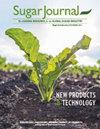Reducing generation of biogenic hydrogen sulfide in sugar wastewaters
IF 0.3
4区 农林科学
Q4 Agricultural and Biological Sciences
引用次数: 0
Abstract
In the manufacture of beet sugar, improving discharge water quality is a key objective for effective reuse of water for irrigation purposes. Problems associated with the discharge water includes generation of odors from biogenic hydrogen sulfide and ammonia, sludge buildup in ponds used for water retention and treatment due to precipitation of metal sulfides, and inadequate water discharge quality, in terms of total nitrogen, ammonia, fecal coliforms count, and phosphorus concentrations. Methods used to improve water quality have focused mainly on either adding chemicals to minimize odor generation, which cause toxicity issues in the discharge water or to add external aeration, which increases dissolved oxygen concentration in the water and improves aerobic treatment rates, but increases power expenditure and hence operating cost. In this paper, use of a biocatalyst solution containing enzymes has been tested in the laboratory and at field-scale. Enzymes function by inhibiting the growth of sulfate reducing bacteria (SRBs) which are responsible for biogenic hydrogen sulfide generation. Experimental and field results show that the enzyme solution tested, ZymeOut, virtually eliminates the generation of biogenic hydrogen sulfide and introduces no water toxicity, unlike conventional biocides. It also reduces the occurrence of biofilms, improves water clarity in lagoons and significantly reduces metal sulfide sludge precipitation.减少糖废水中生物硫化氢的产生
在甜菜糖生产中,改善排放水质是有效再利用灌溉用水的关键目标。与排放水相关的问题包括由生物硫化氢和氨产生的气味,由于金属硫化物的沉淀而在用于保水和处理的池塘中形成污泥,以及总氮、氨、粪便大肠菌群数量和磷浓度方面的排放水质量不合格。用于改善水质的方法主要集中在添加化学物质以减少气味的产生(这会导致排放水中的毒性问题)或添加外部曝气(这会增加水中溶解氧浓度并提高好氧处理率),但会增加电力消耗,从而增加运营成本。在本文中,已在实验室和现场规模上测试了含有酶的生物催化剂溶液的使用。酶的作用是抑制硫酸盐还原菌(SRBs)的生长,而硫酸盐还原菌是产生生物硫化氢的细菌。实验和现场结果表明,与传统杀菌剂不同,所测试的酶溶液ZymeOut几乎消除了生物硫化氢的产生,并且不会产生水毒性。它还减少了生物膜的发生,提高了泻湖水的清晰度,并显着减少了金属硫化物污泥的沉淀。
本文章由计算机程序翻译,如有差异,请以英文原文为准。
求助全文
约1分钟内获得全文
求助全文
来源期刊

International Sugar Journal
工程技术-农艺学
自引率
33.30%
发文量
0
审稿时长
18-36 weeks
期刊介绍:
International Sugar Journal, first published in 1869, is a peer reviewed technical-trade journal focusing on latest developments in sugar technology and sugar industry. The journal embraces scientific and technical advances in agricultural production right through to the production of sugar crystal, as well as economic, trade and policy issues. Main topics include:
• sugarcane and sugar beet production
• front end operations
• cane and beet sugar manufacture
• sugar refining
• economics, trade and legislation and
• biorenewables (cogeneration, biofuels and biobased products)
Related topics, namely analysis, instrumentation, equipment and machinery, food and non-food uses of sugar and alternative sweeteners also form the focus of the journal.
 求助内容:
求助内容: 应助结果提醒方式:
应助结果提醒方式:


